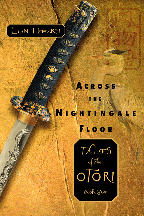Lian Hearn, Across the Nightingale Floor:
Tales of the Otori, Book 1
reviewed by Danielle L. Parker

|
|
Across the Nightingale Floor
Author: Lian HearnPublisher: Riverhead Books, 2002 Length: 287 pages ISBN: 1-57322-225-9 |
What is there about the ninja that holds such an allure for so many people? I can understand without difficulty the fascination of the kung-fu monk: he, like the mythical Knight of the Round Table, is a spiritual warrior who combines a code of chivalry with an extraordinary ability to kick ass. But the allure of the ninja is a darker one. There is no chivalry here; the ninja is the hand that strangles in the dark, that poisons the cup, that leaps from ambush upon the unsuspecting. There is no honor in the ninja: only the terrible pride of skill; the dark fascination with the gurgle of the strangled; the hands that cannot be cleansed even with the gold they palm in payment. The ninja is the killer that strikes in the night and gets away with it. He owes more to Ted Bundy and the Green River Killer than to the knight in either his Oriental or Occidental forms.
The protagonist of Hearn’s story, young Tomasu/Takeo, ponders the allure of both the ninja and the knight archetype in turn, and finds himself drawn, seemingly against his own volition, to his darker side. Young Tomasu is one of the Hidden, Christian-like, gentle people who have become the scapegoat for the viscous warlord Iida of Clan Tohan. One day he returns from a mushroom-gathering expedition to find his village smoking and filled with murderers. His stepfather lies dead in the pathway.
Tomasu manages to escape, by virtue of his fleet feet and a seeming miracle, the slashing sword of Iida himself. In the hills he encounters a stranger who saves his life by killing Tomasu’s pursuers. He is the Otori Shigeru, a lord of the Tohan clan’s rivals, the Otori. He takes young Tomasu under his wing and gives him his new name, Takeo. But why was lord Shigeru so far from home, disguised and at risk in enemy territory? What is his real purpose with young Takeo, who bears an uncanny resemblance, in turn, to the mysterious tribe of ninja-like assassins known as the Kikuta?
Takeo soon finds himself drawn into a web of intrigue. Shigeru’s mysterious friend, a dangerous old man named Kenji, shows up and begins to teach Takeo the ways of the assassins. Lord Shigeru, brave and kind, has a secret use for him; so do the Kikuta. Takeo has some choices to make.
The first part of this story was wonderful. I enjoyed the unusual setting of a mysterious alternate-Japan; the prose is simple, clean, and poetic. But I lost sympathy for the protagonist later on. It’s the dark he chooses; the fatal allure of the ninja’s mastery of death over the bright but sacrificial role of the knight. And it’s hard to be sympathetic with a character who, smitten with the tragic beauty held hostage by evil lord Iida, first deflowers her, then refuses to marry her in spite of her heart-felt, desperate pleas... and then promptly goes on to have a homosexual encounter with a priest. Cad! Bounder! Jerk! Those are the words that occurred to me — that I am allowed to print here, anyway.
Maybe Takeo, in the two sequels to this story, pulls out of his flirtation with the dark side. Or maybe the dark side seduced the author, too — because I don’t think the author intended the reader to form a dislike of the protagonist. In any case, I would have happily gone on to read the sequels if the protagonist had learned more from his savior and foster father, the knight-archetype, Shigeru Otori. But it’s Kenji the assassin who proves to be his true spiritual father. Having made conflicting vows to both the Otori and the Kikuta, it’s the vow to the latter Takeo honors, at least in this story. (And did I mention that it’s Takeo who actually beheads noble lord Shigeru?)
The author has written two more stories in the Tales of Otori: Grass for His Pillow and Brilliance of the Moon. In spite of my annoyance with the protagonist, this first in the series is unusual, original, and cleanly, almost poetically written. Recommended for that, at least.
Just tell me, though, that Kaede, the deflowered and spurned former maiden, whacks off her anti-hero’s dangling parts and tosses them to the dogs in the sequels. Then I’ll read those other two books!
Copyright © 2006 by Danielle L. Parker

